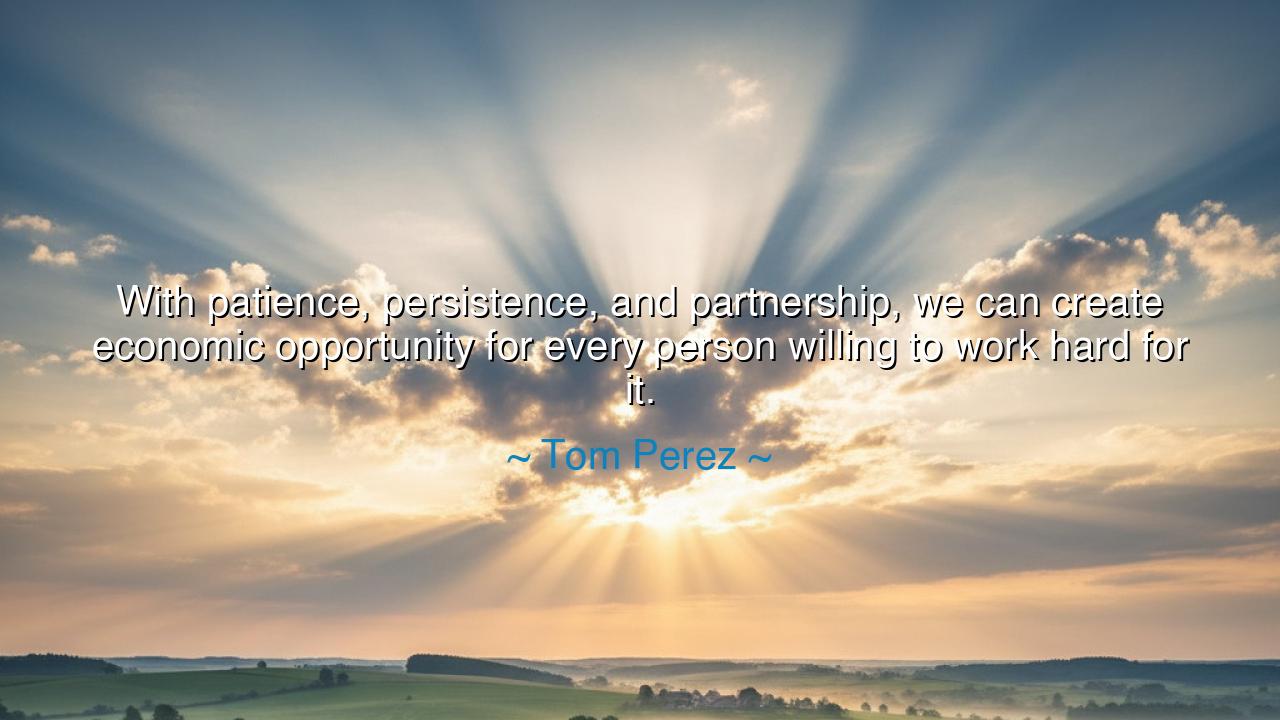
With patience, persistence, and partnership, we can create
With patience, persistence, and partnership, we can create economic opportunity for every person willing to work hard for it.






The words of Tom Perez resound with a rhythm both moral and practical: “With patience, persistence, and partnership, we can create economic opportunity for every person willing to work hard for it.” This is no mere call for policy, but a summons to the eternal virtues that have guided humanity across ages. Patience, the slow fire that tempers steel; persistence, the hammer that never ceases its strike; and partnership, the joining of many hands into one labor. Together, these are not just tools, but sacred instruments for the building of societies where none are left to hunger in shadows.
The meaning of patience in this teaching is profound. It is the soil in which all seeds of growth are sown. Those who desire quick harvests often reap disappointment, for true opportunity blooms only with time. The farmer who plants wheat must wait through sun and storm, trusting in the unseen work of earth. So too must the worker, the entrepreneur, the laborer: their fruit comes not in haste but in endurance. Persistence follows, for patience without effort is but idle waiting. To persist is to rise each dawn, to confront obstacles, to continue the march when the legs ache. It is the heartbeat of progress.
Yet alone, patience and persistence can lead to isolation. Here enters the power of partnership. No edifice of prosperity has ever been built by one man’s hand alone. History testifies to this truth. When Franklin D. Roosevelt launched the New Deal, it was not by solitary will, but through alliances between government, workers, and communities. Bridges were raised, jobs created, and despair lifted because men and women chose to labor together. So also in our age, the sharing of burdens and gifts binds individuals into a greater whole.
Consider the example of the Civil Rights Movement. For generations, African Americans endured with patience, persisting through injustice. But it was only through partnership — churches, workers, students, allies across race — that the great changes were won. Martin Luther King Jr. did not march alone; his voice was amplified by the multitude who believed in a promised land. The fruit of their combined effort was not handed down freely, but wrestled from the grip of inequality through patient struggle, persistent protest, and the partnership of communities united.
Perez’s words are thus not bound to his time alone. They echo the eternal covenant: that economic opportunity is not a privilege of the few, but a birthright of all who are willing to labor. For opportunity is the wellspring of dignity. Without it, a person’s toil is swallowed into futility; with it, the worker may raise a family, educate children, and build a legacy. It is in this sense that the virtues he names become sacred duties, not just personal but communal.
The lesson for us, children of a restless age, is clear. Patience must guide us when we are tempted by shortcuts. Persistence must strengthen us when defeat whispers of surrender. Partnership must remind us that our destiny is woven with the destiny of others. Alone, a single strand breaks easily; together, a cord endures. These are not words for policymakers alone but for every person who builds, dreams, or toils.
Therefore, let each listener take up these three virtues as daily practice. Be patient with your labors, knowing that lasting fruit is slow to ripen. Be persistent in your efforts, refusing to yield to discouragement. And seek partnership, for in helping another to rise, you secure your own ascent. When these three are bound together, no obstacle can prevent the flowering of opportunity, and no man or woman who works hard will be left without hope.
In the end, this teaching is not merely about economics, but about the deeper weaving of a just society. It is about ensuring that the doors of prosperity are open, not locked; that ladders exist for the climbing, not pulled away; that the sweat of honest labor leads to honor, not despair. This is the vision Perez spoke of, but it is also the vision of all who believe in justice. Carry it as a torch, and pass it down, for generations yet unborn will walk by its light.






AAdministratorAdministrator
Welcome, honored guests. Please leave a comment, we will respond soon